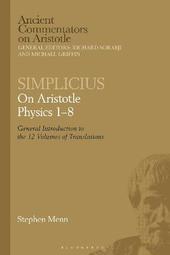
|
Simplicius: On Aristotle Physics 1-8: General Introduction to the 12 Volumes of Translations
Hardback
Main Details
| Title |
Simplicius: On Aristotle Physics 1-8: General Introduction to the 12 Volumes of Translations
|
| Authors and Contributors |
Translated by Dr Stephen Menn
|
| Series | Ancient Commentators on Aristotle |
|---|
| Physical Properties |
| Format:Hardback | | Pages:176 | | Dimensions(mm): Height 234,Width 156 |
|
| Category/Genre | Western philosophy - Ancient to c 500 |
|---|
| ISBN/Barcode |
9781350286627
|
| Classifications | Dewey:530 |
|---|
| Audience | | Professional & Vocational | |
|---|
|
Publishing Details |
| Publisher |
Bloomsbury Publishing PLC
|
| Imprint |
Bloomsbury Academic
|
| Publication Date |
5 May 2022 |
| Publication Country |
United Kingdom
|
Description
Supporting the twelve volumes of translation of Simplicius' great commentary on Aristotle's Physics, all published by Bloomsbury in the Ancient Commentators on Aristotle series, between 1992 and 2021, this volume presents a general introduction to the commentary. It covers the philosophical aims of Simplicius' commentaries on the Physics and the related text On the Heaven; Simplicius' methods and his use of earlier sources; and key themes and comparison with Philoponus' commentary on the same text. Simplicius treats the Physics as a universal study of the principles of all natural things underlying the account of the cosmos in On the Heaven. In both treatises, he responds at every stage to the now lost Peripatetic commentaries of Alexander of Aphrodisias, which set Aristotle in opposition to Plato and to earlier thinkers such as Parmenides, Empedocles and Anaxagoras. On each passage, Simplicius after going through Alexander's commentary raises difficulties for the text of Aristotle as interpreted by Alexander. Then, after making observations about details of the text, and often going back to a direct reading of the older philosophers (for whom he is now often our main source, as he is for Alexander's commentary), he proposes his own solution to the difficulties, introduced with a modest 'perhaps', which reads Aristotle as in harmony with Plato and earlier thinkers.
Author Biography
Stephen Menn is Professor of Philosophy at McGill University, Canada.
|